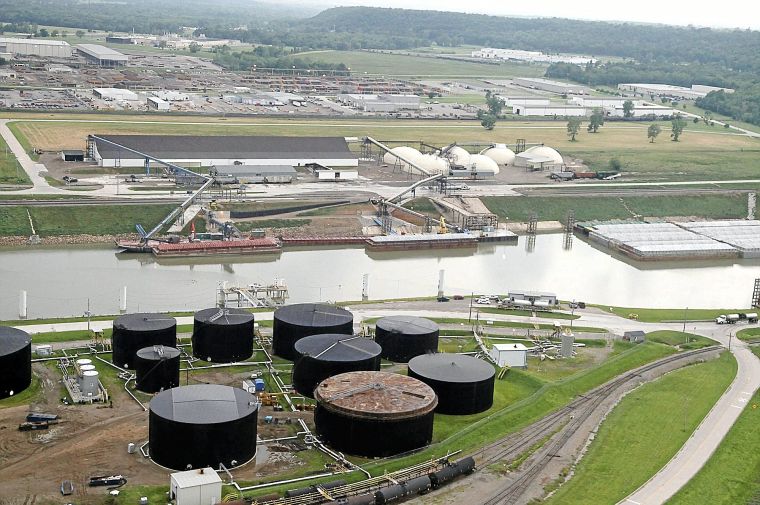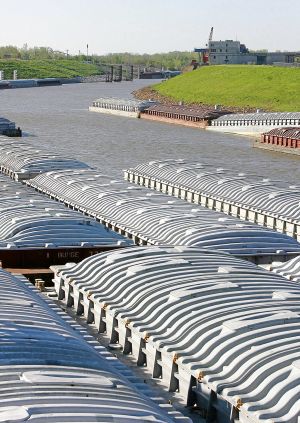-
 The Tulsa Port of Catoosa is an important facility in the trade of manufactured products in North America. TOM GILBERT/Tulsa World
The Tulsa Port of Catoosa is an important facility in the trade of manufactured products in North America. TOM GILBERT/Tulsa World
Posted: Saturday, November 9, 2013 12:00
Free trade with Mexico and Canada is worth more than $4.6 billion annually to Tulsa companies, according to a new report.
The study, "Metro North America: Cities and Metros as Hubs of Advanced Industries and Integrated Goods Trade," analyzes production and trade among North America's metropolitan areas and identifies the top metro trading relationships with Mexico and Canada. The report was released this week as part of the Global Cities Initiative by the Brookings Institution and JPMorgan Chase & Co.
Tulsa was ranked 35th in trade relationships out of 100 U.S. metropolitan areas. Oklahoma City ranked 53rd, and Wichita, Kan., was 46th.
Twenty years after the enactment of the North American Free Trade Agreement, "advanced manufacturing sectors today extend their supply chains across the U.S., Mexico and Canada — anchored by productive metropolitan hubs in all three countries," the report says.
Kevin Shoemaker, president and CEO of Brand Export Packing in Tulsa, said NAFTA and certain trade policies have benefited his company, which designs giant crates for shipments. Yet the agreement hasn't been a win-win for all U.S. companies, he said.
"Our customers have seen increased sales of their products with the incentives of no tariffs on products shipped within the NAFTA zone," Shoemaker said. "Unfortunately, this has also come at a cost for many: A lot of larger equipment that use to be manufactured in the USA is now being built in Mexico where the cheap labor wages are; this has cost a lot of U.S. manufacturing jobs."
The Brookings report took another tact, concluding that the major metro-to-metro exchanges illustrate that North American trade extends well beyond the border.
Nearly 80 percent of the $512 billion in manufactured goods that U.S. metro areas traded with Mexican and Canadian counterparts came from cities in nonborder states.
"At the same time, interior production centers such as Kansas City and Nashville in automotive and Tulsa in energy products also rely heavily on exchange with their North American trading partners," the Brookings report stated.
The report compares the continent's 192 largest metro areas — 100 American, 59 Mexican and 33 Canadian — ranking them according to the amount of advanced products including aircraft and parts, electronics, machinery, motor vehicles and parts, pharmaceuticals and precision instruments.
Of all the goods exported by Tulsa companies, 34 percent went to Canada and Mexico in 2010 — the latest figures available to Brookings. Tulsa's share of that trade was $4.67 billion, report co-author Joseph Parilla said.
Wichita's share of merchandise trade with Canada and Mexico was 22 percent of its global total, worth $3.12 billion, and Oklahoma City's share was 31 percent worth $2.67 billion.
In the global trading environment established 20 years ago by NAFTA, America's main trading partners are Mexico and Canada, and together they produce and export high-value goods to the rest of the world, Parilla said.
"In both quantity and quality, North American trade is unique," he said. "The United States trades as much with its North American neighbors as it does with Japan, Korea and the BRICS — Brazil, Russia, India, China and South Africa — combined. And at least a quarter of what we import from Mexico and Canada is actually American-made content; for China, that number is 4 percent."
Exports sustain thousands of Oklahoma businesses, with 3,159 companies exporting manufactured goods in 2011. Of those, 2,687 companies, or 85 percent, were small and medium-size enterprises with fewer than 500 employees, according to International Trade Administration data published August.
Much of Oklahoma's export volume flows out through the McClellan-Kerr Arkansas River Navigation System.
Bob Portiss, director of the Tulsa Port of Catoosa, said reading the Brookings report reminded him that "our inland waterway is still in a world of hurt" because of underfunded maintenance.
The McClellan-Kerr system has $80 million to $100 million worth of critical maintenance backlog, Portiss said. The U.S. Army Corps of Engineers' definition of "critical backlog item" is "a repair item with a 50 percent or greater probability of failing within the next five years if not repaired," he noted.
"We're not maintaining our infrastructure, and we need to do so if we're really going to compete globally and be able to handle the doubling of international trade they're predicting within the next decade," Portiss said.
The study, "Metro North America: Cities and Metros as Hubs of Advanced Industries and Integrated Goods Trade," analyzes production and trade among North America's metropolitan areas and identifies the top metro trading relationships with Mexico and Canada. The report was released this week as part of the Global Cities Initiative by the Brookings Institution and JPMorgan Chase & Co.
Tulsa was ranked 35th in trade relationships out of 100 U.S. metropolitan areas. Oklahoma City ranked 53rd, and Wichita, Kan., was 46th.
Twenty years after the enactment of the North American Free Trade Agreement, "advanced manufacturing sectors today extend their supply chains across the U.S., Mexico and Canada — anchored by productive metropolitan hubs in all three countries," the report says.
Kevin Shoemaker, president and CEO of Brand Export Packing in Tulsa, said NAFTA and certain trade policies have benefited his company, which designs giant crates for shipments. Yet the agreement hasn't been a win-win for all U.S. companies, he said.
"Our customers have seen increased sales of their products with the incentives of no tariffs on products shipped within the NAFTA zone," Shoemaker said. "Unfortunately, this has also come at a cost for many: A lot of larger equipment that use to be manufactured in the USA is now being built in Mexico where the cheap labor wages are; this has cost a lot of U.S. manufacturing jobs."
The Brookings report took another tact, concluding that the major metro-to-metro exchanges illustrate that North American trade extends well beyond the border.
Nearly 80 percent of the $512 billion in manufactured goods that U.S. metro areas traded with Mexican and Canadian counterparts came from cities in nonborder states.
"At the same time, interior production centers such as Kansas City and Nashville in automotive and Tulsa in energy products also rely heavily on exchange with their North American trading partners," the Brookings report stated.
The report compares the continent's 192 largest metro areas — 100 American, 59 Mexican and 33 Canadian — ranking them according to the amount of advanced products including aircraft and parts, electronics, machinery, motor vehicles and parts, pharmaceuticals and precision instruments.
Of all the goods exported by Tulsa companies, 34 percent went to Canada and Mexico in 2010 — the latest figures available to Brookings. Tulsa's share of that trade was $4.67 billion, report co-author Joseph Parilla said.
Wichita's share of merchandise trade with Canada and Mexico was 22 percent of its global total, worth $3.12 billion, and Oklahoma City's share was 31 percent worth $2.67 billion.
In the global trading environment established 20 years ago by NAFTA, America's main trading partners are Mexico and Canada, and together they produce and export high-value goods to the rest of the world, Parilla said.
"In both quantity and quality, North American trade is unique," he said. "The United States trades as much with its North American neighbors as it does with Japan, Korea and the BRICS — Brazil, Russia, India, China and South Africa — combined. And at least a quarter of what we import from Mexico and Canada is actually American-made content; for China, that number is 4 percent."
Exports sustain thousands of Oklahoma businesses, with 3,159 companies exporting manufactured goods in 2011. Of those, 2,687 companies, or 85 percent, were small and medium-size enterprises with fewer than 500 employees, according to International Trade Administration data published August.
Much of Oklahoma's export volume flows out through the McClellan-Kerr Arkansas River Navigation System.
Bob Portiss, director of the Tulsa Port of Catoosa, said reading the Brookings report reminded him that "our inland waterway is still in a world of hurt" because of underfunded maintenance.
The McClellan-Kerr system has $80 million to $100 million worth of critical maintenance backlog, Portiss said. The U.S. Army Corps of Engineers' definition of "critical backlog item" is "a repair item with a 50 percent or greater probability of failing within the next five years if not repaired," he noted.
"We're not maintaining our infrastructure, and we need to do so if we're really going to compete globally and be able to handle the doubling of international trade they're predicting within the next decade," Portiss said.


No comments:
Post a Comment